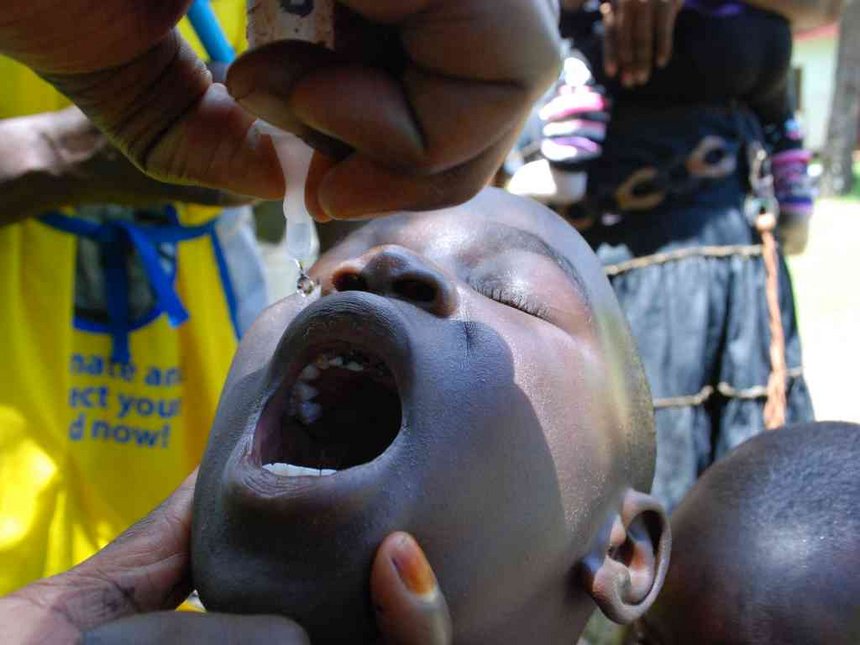
Parents have expressed concern over serious side effects they claim their children manifest after getting the new round of the recently concluded polio vaccination.
The process was conducted by the ministry of health in Nairobi, Kajiado, Machakos, Kiambu, Meru, Isiolo, Tana River, Lamu Garissa, Mandera Wajir, and Kitui counties.
It is now emerging that some children have developed adverse side effects including convulsion, diarrhoea, fever and vomiting.
Marion Katabi, an accountant in Nairobi says on Wednesday her two-year-old son got suddenly sick. The boy started vomiting, shivering and sweating. At the hospital, a series of tests were done, but had nothing conclusive. She was given antibiotics and told to monitor the child as more tests are done. Marion suspects her son’s health has been affected by polio vaccination.
“From Tuesday evening when he was given that drop, he became irritable. I assumed it is a mild side effect, but things have gotten more serious,” she says.
On social media, many parents registered concern and associated the effects to the vaccine, saying they started noticing a change in their children immediately after they were vaccinated.
The Ministry of Health has however denied any connection of the symptoms to the vaccine. Director of Medical Services Dr Jackson Kioko said the symptoms are likely to be a sign of flu in children, and has nothing to do with poliovaccination.
“Kenya usually experiences increased flu cases twice in a year. The first upsurge of flu cases runs from March to May while the second increase runs from July to October every year. We are therefore currently experiencing the second flu season in the country. This explains the increase number of patients presenting with high grade fever in health facilities,” read part of their statement to newsrooms.
Dr Peter Cherutich, Deputy Director of Medical Services at the Ministry of Health explained that even though this is a new combination of the oral polio vaccination (OPV) drug, it is not the first time they are using it in Kenya. He said they had used it during their vaccination in May, and they did not get complaints of resistance.
However, the ministry’s statement comes a week after the World Health Organisation (WHO) said OPV used for prevention of the disease has been linked to the recent outbreaks of the virus that is re-merging in some countries, including Kenya.
It is emerging the use of this oral vaccine, which contains some mild strains of the virus, will put a healthy person at risk when they come in contact with the mutated vaccine and they happen not to be immunised.
WHO said once the vaccine has stimulated the immune system to defend the body against polio, it is excreted, but comes out already mutated.
It is this mutated version of the vaccine that ends up causing polio infections. WHO Director of Polio Eradication Programme Michel Zaffran however told media that though the oral vaccine has been linked to the outbreaks, it is not yet time to withdraw it from the market.
Chicken and egg
“In terms of these outbreaks caused by the vaccine-derived viruses, this can only be stopped when we stop altogether using the vaccine, and we will not stop using the vaccine until we have eradicated the wild virus. So it is a chicken and egg situation,” said Zaffran.
It is only after the virus has been completely eradicated that oral polio vaccines will be withdrawn globally.
Another type of polio vaccine is the injectable, known as the Inactivated Polio Vaccine (IPV). It is derived directly from the polio wild virus, but is not as effective as OPV since it is not ‘live’ and only offers protection to the victim, but does not stop them from being infected.
Even with IPV, one might not show signs of polio but they can still infect others, just like any other polio stricken patient. “IPV induces very low levels of immunity in the intestine. As a result, when a person immunised with IPV is infected with wild poliovirus, the virus can still multiply inside the intestines and be shed in the faeces, risking continued circulation,” states the Global Polio Eradication Initiative body.
This is not the first time the Ministry of Health is facing accusations over possible side effects of their vaccines.
In 2016, Agriq Quest Limited, a company in Nairobi accused the government of giving contaminated polio and tetanus vaccines to children and women. This was after testing 56 samples of the vaccine.
The accusations led to formation of a committee of experts to determine the content of the drugs, but the details of the findings were never made public.
 The Standard Group Plc is a multi-media organization with investments in media
platforms spanning newspaper print
operations, television, radio broadcasting, digital and online services. The
Standard Group is recognized as a
leading multi-media house in Kenya with a key influence in matters of national
and international interest.
The Standard Group Plc is a multi-media organization with investments in media
platforms spanning newspaper print
operations, television, radio broadcasting, digital and online services. The
Standard Group is recognized as a
leading multi-media house in Kenya with a key influence in matters of national
and international interest.











